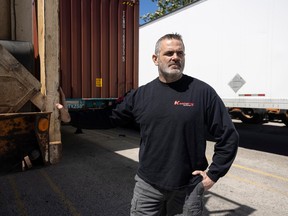Truckers licensed to serve the Port of Vancouver face new rules on December 1

Article content
In the 25 years since Tom Johnson founded his Delta-based shipping company, it has endured several port strikes and the uncertainty of the global pandemic.
However, changes proposed by the office that oversees the container shipping industry in British Columbia could cause unprecedented job losses, Johnson said.
Article content
He and other container truck operators are concerned that licensing changes proposed by British Columbia’s Office of the Container Transportation Commissioner will hurt small and medium-sized businesses that transport goods to and from the Port of Vancouver.
Advertisement 2
Article content
Trucking companies must be licensed to access the port. Trucks with licenses or tags typically make a short distance trip with the container to a warehouse, called hauling. To save costs, many of the licensed companies will hire so-called “shadow” companies, whose trucks are not licensed, to move containers on long-distance trips.
According to a published report As the commissioner said last week, companies will soon be “prohibited from cooperating with any unlicensed person performing off-dock work within the Lower Mainland.”
Commissioner Glen MacInnes said the aim is to crack down on companies subcontracting unlicensed container trucks and thus avoid the fees that must be paid to his office.
“So one of the things we wanted to stress to the industry is ‘look, you can’t get around the (Container Shipping) Act by creating a separate company and then giving business to that company and then paying a lower rate. ” he said. “Because that undermines the whole system.”
But Johnson said the changes could hurt shipping companies by cutting off access to unlicensed parts of their own businesses, such as long-haul shipping.
Article content
Advertisement 3
Article content
“It will cut my business in half,” said Johnson, owner of Kimberly Transport and spokesman for the Port Transportation Association, which represents trucking companies working in the Port of Vancouver. “He’s basically telling me to pick a side. “Either you do port work or you do unregulated work.”
Johnson said he has 13 trucks servicing the port and 20 trucks doing unregulated container work.
Johnson also fears he won’t be able to do business with some of Canada’s largest shipping companies, including Clarke, Vitran, CN and Fastfrate, because they are not licensed port carriers.
MacInnes also warned companies that it could be reducing its label allocations based on past incidents of rule-breaking.
“So reducing those labels means someone is losing their job. That’s what it amounts to,” Johnson said. “These are things that bother companies. These small and medium-sized companies are risking the house. I understand there may be a couple of bad actors out there. But not enough to justify discomfort for the entire industry.”
Johnson said he and other drivers are concerned that the commissioner will reduce tag allocations for B.C. container companies in favor of issuing tags to larger companies.
Advertisement 4
Article content
“We’re speculating that he’s planning to get rid of some companies, get them out of the system systematically and make room for the Loblaws … and other companies from other provinces to come in,” Johnson said.
MacInnes said it’s not true that he’s trying to open the door to larger companies.
“My office’s goal is to recognize the contribution and service of existing licensees… because they have a track record in the industry.”
The commissioner’s office was created in 2014 to oversee the licensing of port container carriers and ensure drivers are paid fairly. It regulates the trucking industry through port truck tag assignments, issuing around 1,600 every two years.
MacInnes said it’s important to match the number of container trucks operating with the number of containers passing through the Port of Vancouver to prevent competitors from undercutting owner operators, which he said was a problem before it was implemented. establish the office.
“Ultimately, if we were to allow all of these outsourced trucks into the system, we would be back to the same problem: We have too many trucks chasing too few containers and undercutting would start all over again,” he said.
Advertisement 5
Article content
More than 100 container truckers showed their opposition to the changes through a demonstration on Sunday, organized by the Port Transport Association. A convoy left Annacis Island and headed toward downtown Vancouver, but police prevented the convoy from passing through Canada Place.
The changes will take effect on December 1, 2024.
The association is requesting an exemption clause that exempts existing small and medium-sized transport companies from the new rules.
This would ensure that “established port carriers are not eliminated from the licensing system to make way for large conglomerates or to allow larger companies to prosper at the expense of B.C.’s small and medium-sized businesses,” the association said.
Recommended by Editorial
Bookmark our website and support our journalism: Don’t miss the news you need to know – add VancouverSun.com and LaProvincia.com to your favorites and subscribe to our newsletters here.
You can also support our journalism by becoming a digital subscriber: for just $14 a month, you can get unlimited access to The Vancouver Sun, The Province, National Post and 13 other Canadian news sites. Support us by subscribing today: The Vancouver Sun | The province.
Article content



